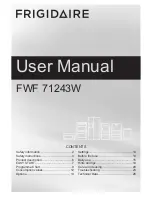
Parts and functions
There are 6 different settings; the normal dosage setting is 3.
Important
Proper dosage of the rinse aid improves drying.
If drops of water remain on the dishes or spotting occurs,the dosage adjustor should be
turned to a higher setting.
If the dishes have white streaks,turn the dosage adjustor to a lower setting.
Loading the Dishwasher
Before placing the dishes in the dishwasher,
remove the large food particle to prevent the filter
from becoming clogged,which results in reduced
performance.
If the pots and pans have baked-on food that is
extremely hard to remove, we recommend that
they be allowed to soak before they are
washed.This will eliminate the need for extra wash
cycles.
Pull out the rack to facilitate loading the
dishwasher.
How to Use the Lower Rack
We recommend that you place the most difficult to clean
items on
the lower rack: pots, lids, serving dishes and bowls, as
shown in
the figure to the right.
It is preferable to place serving dishes and lids on the
sides of the
racks in order to avoid blocking the rotation of the top
spray arm.
- Pots, serving bowls, etc. must always be placed top
down.
- Deep pots should be slanted to allow the water to flow
out.
- The silverware basket can be doubled (see fig. A) so
that only
one section may be used when the silverware load is
light. this
also makes space for additional pots and pans, and it can
also
be placed in the upper rack.
- Silverware should be placed in the silverware basket with the
handles at the bottom; if the rack has side baskets, the spoons
should be located individually into the appropriate slots. Espe-
cially long utensils should be placed in the horizontal position at
Summary of Contents for WQP12-EFMS
Page 7: ...Safety Precaution 4 Safety Precaution ...
Page 8: ...Safety Precuation ...
Page 10: ...Warning and Cautions 5 Weekly maintenance ...
Page 13: ...Parts and Functions 8 Parts and functions ...
Page 19: ...Program Diagram 10 Program Diagram ...















































